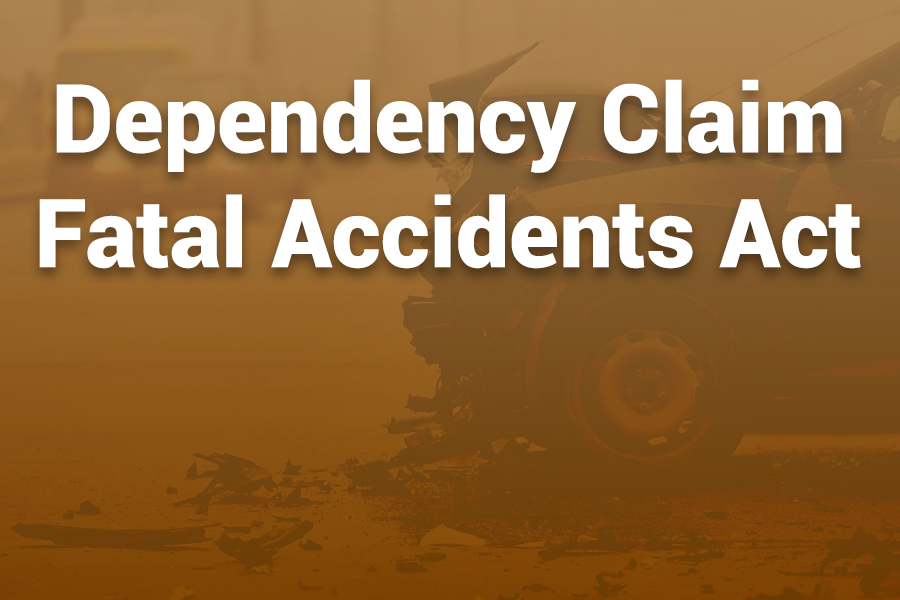When a loved one dies because of another party’s negligence, the emotional toll is immense. Beyond grief, many families also face financial hardship when the support they relied on disappears. The Fatal Accidents Act 1976 allows dependents to claim compensation for this loss.
A dependency claim can cover both financial contributions and services the deceased provided. It helps families maintain stability after a tragic event. In this article, you will learn who qualifies as a dependant, what can be claimed, how courts calculate compensation, and the key cases that guide these claims today.
Understanding the Fatal Accidents Act 1976
The Fatal Accidents Act 1976 provides the legal foundation for dependants to claim compensation when someone dies due to negligence or wrongful acts. Before this Act, dependants had no right to bring a claim. The law ensures that families who relied on the deceased for financial and personal support can seek redress.
The Act allows only one action to be brought, which must include all dependants. This avoids multiple lawsuits and ensures fair distribution of damages. Importantly, claims focus on what the deceased would reasonably have provided had they lived.
Who Qualifies as a Dependant
The Act sets out who can make a claim. This group is broad to reflect modern family structures. Dependants include:
- Spouse or civil partner
- Former spouses and civil partners
- Cohabitants living together for at least two years before death
- Children, including stepchildren and adopted children
- Parents and grandparents
- Siblings, aunts, uncles, and others treated as part of the family
- Unborn children who would have been financially supported
The courts recognise that financial and emotional support extends beyond traditional definitions of family. That means even individuals not formally related may qualify if they can show they were treated as dependants.
Types of Loss Covered
Dependency claims fall into two main categories: financial dependency and services dependency.
Financial Dependency
This covers the income, benefits, and financial support the deceased provided. It includes salary, pension contributions, bonuses, and other regular payments. Courts consider the proportion of the deceased’s income that supported the family rather than personal expenses. Even irregular contributions, such as occasional financial gifts, can be factored in if they were consistent and reliable.
Services Dependency
Many people contribute in non-financial ways, and the law recognises this. Services dependency covers tasks like childcare, cooking, cleaning, gardening, DIY, and elder care. These contributions have an economic value, as families would otherwise need to pay for them. Courts assign a financial figure to the value of these services when calculating compensation.
How Courts Assess Compensation
Courts use careful methods to calculate damages. The process involves several steps:
- Establishing the deceased’s income and likely future earnings.
- Deducting the portion the deceased would have spent on themselves.
- Considering services the deceased provided and their replacement value.
- Applying a multiplier to reflect the period the dependency would likely have continued.
For example, if a young parent dies, the dependency period may extend until the children become financially independent. Courts also consider factors like life expectancy, health, and work prospects of the deceased.
Key Case Law Shaping Dependency Claims
Several important cases shape how courts interpret the Fatal Accidents Act.
- Davies v Taylor (1974): Established that dependants must prove a real chance of financial support, not just a possibility.
- CC v TD (2018): Reiterated that services such as childcare have measurable value and should be compensated fairly.
- Paramount Shopfitting v Rix (2021): Confirmed that even where financial support is irregular, a reasonable expectation of contribution can justify a claim.
These cases highlight the evolving recognition of financial and service contributions within families.
Bereavement Awards vs Dependency Claims
Alongside dependency claims, the Act provides for a statutory bereavement award. This is a fixed sum currently set at £15,120 in England and Wales. It is limited to certain relatives such as spouses, civil partners, and parents of unmarried children under 18.
However, dependency claims differ significantly. They aim to provide financial compensation based on the actual loss suffered. While bereavement awards acknowledge grief, dependency claims cover tangible financial and service-based losses.
The Role of Contributory Negligence
Not every claim results in full compensation. If the deceased contributed to the accident, damages may be reduced under contributory negligence principles. For example, if the deceased was partially at fault in a fatal car accident, the compensation awarded to dependants would be adjusted proportionally.
Practical Examples of Dependency Claims
To illustrate, consider a family where a father provided both income and household services. After his death in a workplace accident, his spouse and children can claim for:
- His lost income, adjusted for personal expenses
- Pension contributions he would have made
- Childcare and household services he provided
- Reasonable funeral expenses
In another example, an elderly parent providing childcare for grandchildren can be recognised for the services they provided. Even if no financial support existed, the services dependency claim can succeed.
Additional Claims under the Inheritance Act
Dependants may also bring claims under the Inheritance (Provision for Family and Dependants) Act 1975. This Act allows individuals to claim from the deceased’s estate if they were being maintained immediately before death. It often runs alongside dependency claims to ensure dependants receive adequate provision.
Evidence Required for Claims
Strong evidence supports successful claims. Courts expect documents that show income, financial support, and services provided. Useful evidence includes:
- Payslips and tax returns
- Bank statements showing regular transfers
- Receipts for household contributions
- Witness statements about services provided
- Records of childcare or elder care arrangements
Dependants must prove that the support was more than casual. A reasonable expectation of future support is enough even if not provided at the time of death.
Importance of Legal Representation
Dependency claims can be complex. Lawyers play a key role in gathering evidence, valuing services, and presenting a strong case. They ensure claims are filed within the limitation period, usually three years from the date of death.
Specialist solicitors also negotiate with insurers, who often dispute the extent of dependency. Expert representation improves the chances of securing fair compensation.
Recent Trends and Reforms
Courts are increasingly recognising the value of unpaid services. In modern households, contributions extend beyond financial income. Judges now regularly assign economic value to housework, childcare, and even emotional support.
There are also discussions about reforming the statutory bereavement award. Campaigners argue the current amount is too low and the eligible group too narrow. Expanding this could bring greater fairness for unmarried partners and extended families.
Challenges in Dependency Claims
Despite legal protections, dependants face challenges:
- Proving dependency when financial support was irregular
- Valuing services fairly, especially when provided informally
- Dealing with insurers who minimise payouts
- Emotional strain of reliving the loss during legal proceedings
These obstacles make legal guidance essential. Families should prepare for a detailed investigation of their financial and personal lives.
Why These Claims Matter
The purpose of dependency claims is not to put a price on life. Instead, it is to restore stability for those left behind. The law acknowledges that families rely on both money and services to function. By compensating for these losses, dependency claims help dependants rebuild their lives.
Conclusion
Dependency claims under the Fatal Accidents Act 1976 play a vital role in protecting families from financial collapse after a wrongful death. They cover lost income, pensions, and essential services, ensuring dependents do not face hardship on top of grief.
With the right evidence and representation, families can secure fair compensation. The law continues to evolve, recognising the diverse ways people contribute to family life. While no claim can replace a loved one, it can provide the security needed to move forward.









